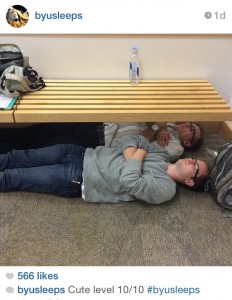It may seem ironic that November is National Sleep Comfort Month because it’s also a time for midterms, final reports and all-nighters in the library. Students may have difficulty sleeping or making time for proper rest as end-of-semester projects and finals lurk right around the corner.
Maureen Rice, director of Stress Management and Biofeedback Services, suggested some tips for sleeping well. Sleep is necessary to keep a body functioning and may be just as necessary for academic success.
“You can pull an all-nighter once in a while, but I think the benefits are short-lived,” Rice said. “If you do that frequently, it’s going to lead to more unproductivity.”
Rice said sleep deprivation increases production of stress hormones like adrenaline. This causes concentration and memorization problems, weakening one’s ability to retain information longer.
 Sophomore Chase Driggs said he would rather sleep than stay up late to finish an assignment. “I’m terrible if I don’t get enough sleep,” Driggs said.
Sophomore Chase Driggs said he would rather sleep than stay up late to finish an assignment. “I’m terrible if I don’t get enough sleep,” Driggs said.
Rice said going to bed late for five nights in a row takes at least five more nights of proper sleep to become fully rested again. “It’s difficult to make up for lost sleep,” Rice said.
Running on no sleep during the week and trying to make up for it on weekends actually increases sleepiness for the next week. Rice recommended getting up and going to sleep at the same time every day, even on weekends, to avoid interrupting one’s natural body clock.
Sophomore Maxwell Worsham said he would rather wake up earlier the next morning to finish an assignment than stay up late. He usually sets apart one hour a day to work on his most pressing assignment. “In the library when I’m not with my roommates … no one’s going to distract me,” Worsham said. “I can get a lot done … (so when) I’m tired I (can) go to bed.”
He said he is able to balance school and a job and still have time for proper sleep.
For students who make the time to sleep but don’t find quality sleep, melatonin and meditation can help. Rice said over-the-counter melatonin can be effective, but meditation is a more natural approach.
Meditation has been scientifically proven, according to Rice, to boost the body’s neural sleep chemicals like melatonin. Melatonin is the chemical that helps people sleep more soundly; its purpose is to create restful sleep.
Rice recommends turning off bright screens at least a half hour before bed and using sunlight, or even artificial light, to wake up in the morning. Taking cat naps are beneficial as long as they do not last longer than 20 minutes. If the body falls into deeper stages of sleep, people are likely to feel groggy upon waking.
Good study habits, planning and dealing with procrastination habits may help students find adequate time to follow their natural sleep cycles and get adequate rest.
Worsham said his secret during finals week is to make time for sleep; “otherwise it’s horrible,” he said.
Driggs said “basic time-management” is all it takes to be able to get to bed by midnight and get nearly seven hours of sleep.
Students can visit the Counseling and Psychological Services website at http://caps.byu.edu and click on the Stress Management tab for a variety of resources about sleeping for students.
Click here for access to relaxation recordings that guide meditation. Click here for a list of 14 insomnia busters.
Students with serious sleep issues that persist for longer than a few weeks should seek attention from a medical doctor.




